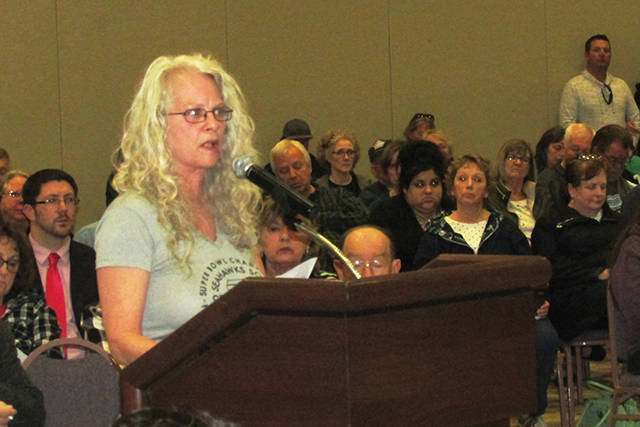A group of citizens concerned with crime in the northeast section of Ocean Shores appealed to the City Council Monday night for more attention and solutions to what they perceive to be a growing problem.
The group gathered Sunday night at the Canterbury Inn and about 38 citizens showed up to share their issues and ideas.
Speakers included Patricia Main (creator of the group’s Facebook page, “Take Rain Street Back”), Sharon and Rick Selby who live on Rain Street, and Randy Peck of Ocean Shores Block Watch.
“The Facebook page was created on May 2 because the property owners were exasperated with all the drug houses and activity that continues on this street, with no apparent resolve from the police,” Sharon Selby explained. She said the group now includes 71 members.
One particular house on Rain Street, according to the citizens, includes known drug users “seen entering and exiting at all hours.” Selby described incidents of drugs being sold in front of watching neighbors, kids being approached, animal neglect, derelict properties, squatters, garbage, increased theft reports and (most recently) an assault and armed robbery that started at the local grocery store parking lot.
Main said she has seen at least 14 people living in in the house across from her home, and read a letter from another resident who has found syringes in her yard. “One was right under her porch,” Main said.
Group members offered several suggestions to take more action against nuisance properties, and to aid the city in dealing with what happens when properties are condemned and/or abated.
“We’re not just complaining. We have some ideas for resolution,” Sharon Selby said. “… We are a peaceful, but insistent group of people and we want resolve. We can and will make a difference.”
Peck suggested adopting a “Chronic Nuisance Ordinance” as outlined in Seattle city code and in use in other areas such as Bremerton and Yakima. Another idea was to create a specific Block Watch group for Rain Street.
“The ordinance is only half of the solution,” Peck noted. “The other half is having abatement money and abating properties that are the junk ones, the derelicts, the burnt out, abandoned — those properties are all over town.”
He noted the property owners can take action themselves in small claims court, but urged the city to adopt tougher city laws, such as his proposal for the more stringent nuisance ordinance. Three or more nuisance complaints in 60 days or 7 or more in 12 months would be actionable.
“This ordinance gives the police the power to intercede,” Peck said.
Shannon Rubin criticized the City Council for not acting on earlier public appeals about crime in the area: “Crime continues to be an issue, and incidents are becoming more and more public.” She said the council appears to have “blinders on this issue.”
“You need to stop living like ostriches with your heads in the sand,” Rubin said.
Joan Richmond has lived on Galleon Loop “for many, many years, and it was a great neighborhood.” But then “a drug house moved in” and the “neighborhood is being destroyed,” she said.
Susan Conniry urged the city to support the chronic nuisance ordinance, the Rain Street Block Watch effort and to also consider forming a citizens public safety advisory committee with a council liaison, the Police Chief, citizens, and business and school district representation.
Later in the council meeting, Mayor Crystal Dingler suggested holding a City Council study session, or possibly two study sessions, on crime and abatement issues, as well as health and safety concerns. She said she would provide materials to the council members showing crime statistics, locations and outlining the city’s current ordinances.



